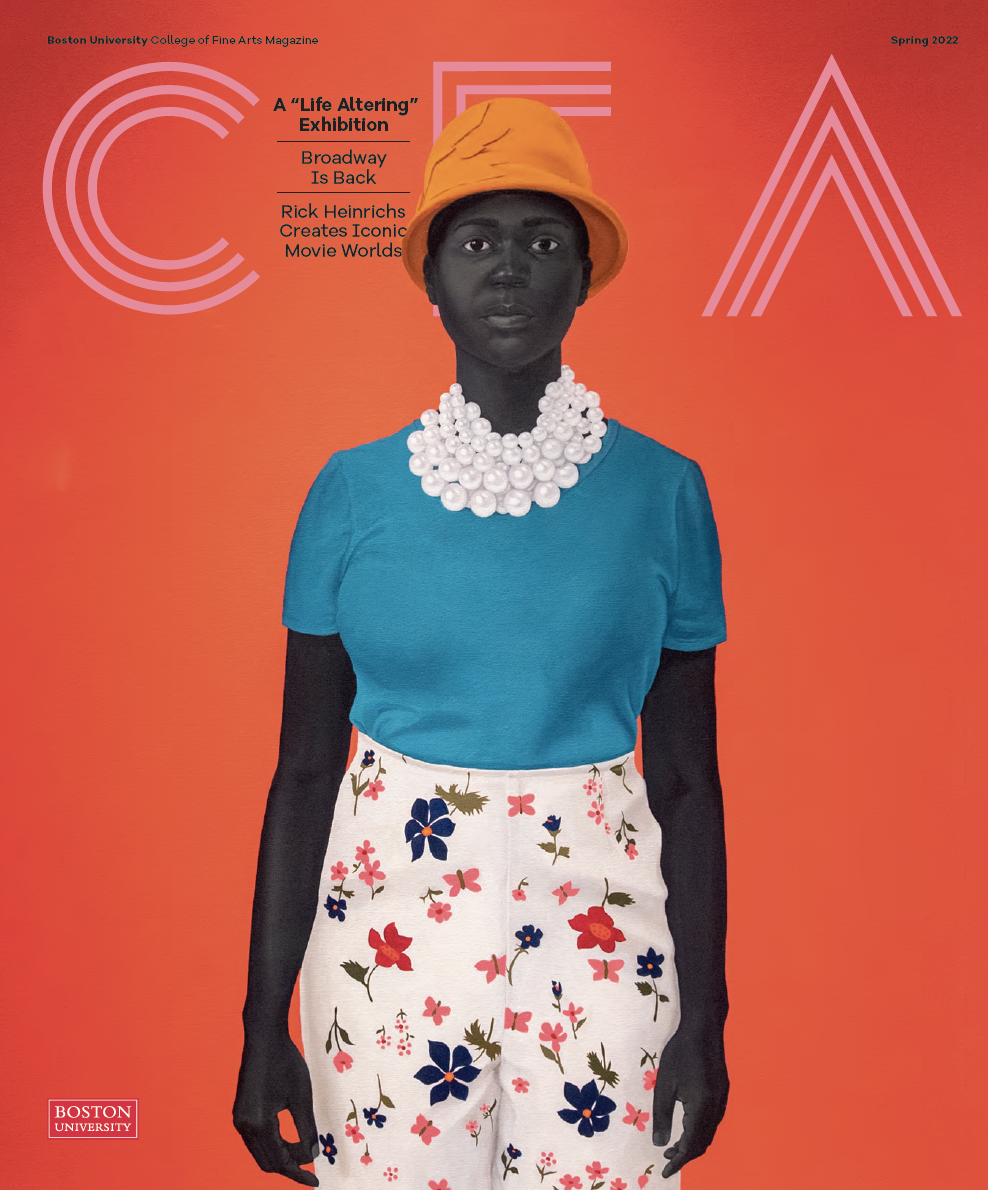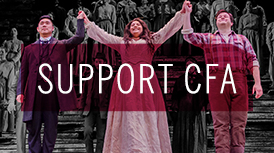Queens of Funny-Sad
Michaela Watkins (’94) (left) and Boo Killebrew (’03) are connoisseurs of funny-sad.
Actor-Writers Michaela Watkins and Boo Killebrew Talk Creative Hang-ups, Bold Writing, and Funny Tragedies
Edited by Lara Ehrlich | Photos by Maggie West
Valerie, a freshly divorced single mother on Hulu’s show Casual, is waiting for her much younger one-night stand to text her back. In a bold move, she takes matters into her own hands and shows up uninvited at his apartment. He’s not happy to see her. Valerie, portrayed by Michaela Watkins, flees to the elevator. She begins laughing at the absurdity of the encounter and ends up sobbing. The doors open. Valerie collects herself, smiles at the bewildered couple waiting for the elevator, and pushes past them into the lobby.
In this short scene, Watkins (’94) gives “a remarkable, simple, honest piece of acting, encompassing much more than the sting of suddenly feeling unwanted by a person whose bed you were in just that morning,” says The A.V. Club. “It encompasses the failure of a marriage, aging, fear, foolishness.” The scene exemplifies Watkins’ mastery of small but vital moments of tragicomedy. “It’s perfect. It’s vast, and still tiny.”
A Saturday Night Live alumna, Watkins is known as much for her comedy chops (she has portrayed Joan Rivers, Barbara Walters, and Arianna Huffington on the show) as for her tragicomic roles in Casual (in which she is also credited as a writer) and other series, like ABC’s Trophy Wife and Amazon’s Transparent. As fellow writer and actor Boo Killebrew says, Watkins does “funny-sad really well.”
Killebrew (’03) is a connoisseur of funny-sad. The playwright, actress, and cofounder of CollaborationTown theater company is best known for her plays, in which she demonstrates an “ability to find the humor as well as the underlying love in her characters,” Variety says. She has won numerous awards, including an NYFA fellowship for playwriting and the 2018 Joseph Jefferson Equity Award for New Work for Lettie, about a woman returning to her family after incarceration. As an actress, she has appeared in the web series Whatever this is, which USA Today, The Guardian, and Indiewire named to their best of 2013 lists.
Watkins and Killebrew connected by phone to talk about their shared love for dark comedy, and how early acting challenges sent their careers along unexpected trajectories.
Boo Killebrew: I’m always looking for role models. You’ve had this really varied and awesome career and are so versatile. What did you do at CFA?
Michaela Watkins: I was an acting major. I’m from Syracuse, New York, so the idea of going into film and television was like saying, “I’m going to go to space camp.” It just was not something that was available. We had a really good theater, and that was what turned me on so much. I felt like theater was an achievable goal. I was cut from the acting program after my sophomore year. I was devastated.
I think I was so blocked by what I thought I should be. I was so self-conscious, and I was always aware of what my voice was doing and how I was walking and talking. I was so deeply hidden unless I was doing outright comedy. But I didn’t really show that side of myself, and the rest of the time I was just trying to be right, to be good, and I was failing miserably at it. I felt really hemmed in.
“CFA doesn’t say, ‘Hey, welcome to your freshman year, go be on Broadway!’ I think CFA says, ‘Hey, this is a car; let’s take all the parts and name them, so that if you’re out in the world and your car breaks down, you know how to put it back together.’” Michaela Watkins (‘94)
BK: I always ended up doing some weird standard American accent.
MW: I do the exact same thing! I didn’t blossom until probably two years later.
BK: What do you think happened? Because I’m not there yet, and I would love to get to that point one day.
MW: I’ve taught improv for a long time, and the whole point is to tell people to just be bad, because out of that bad comes great.
I think that’s what CFA is, right? CFA doesn’t say, “Hey, welcome to your freshman year, go be on Broadway!” I think CFA says, “Hey, this is a car; let’s take all the parts and name them, so that if you’re out in the world and your car breaks down, you know how to put it back together.”
BK: That’s a great metaphor. I wish I could have had that perspective when I was in school. I put so much pressure on myself, and I think that also carried over when I got out of school. I was auditioning a lot as an actor, and I was just a terrible auditioner. And I think it’s that same mind-set of wanting to please and to hit the marks. But the really good stuff comes when I’m writing. When I’m making things, somehow that judgment just goes away.
MW: Tell me about writing your first play. Did you find a freedom in it?
BK: Yes. It felt like for the first time I was actually truly honest with myself. When I wrote, I felt truly vulnerable. I felt scared in the best possible way. I just never had that feeling when I was thinking about how I was standing, how I was talking.
I was writing, and then I met a group of people in the program, and we started making ensemble pieces that were totally brilliant! No, I’m just kidding; they were college art school, for sure. It was like, “Oh! I can have fun when I do this!” I had put all this pressure on myself and acting was so serious and emotionally taxing. But these people cracked me up, and we couldn’t stop laughing.
MW: You just reminded me that when I was a senior in theatre studies, I started an improv group because there’d never really been one. We were just flying by the seat of our pants. We’d meet once or twice a week in a classroom and do improv and crack each other up. Why did you start acting in the first place?
BK: I’m also from a small town—in Mississippi—and I knew I wanted to be involved in theater, but the only way to do that was to act, because I didn’t have exposure to playwrights, designers, and all that kind of stuff. So it took me a long time to wrap my head around the fact that you could make things.
MW: Do you act in most of your plays?
BK: No, I rarely act in my plays. That’s hard for me to do.
MW: What are you working on now?
BK: I was just a writer on an FX show called Mrs. America.
MW: You’re a writer on that show? I read for the part of Betty Friedan!
BK: Shut up! That’s my episode! Wait, Michaela, you’re perfect for that. I’ll actually call them right now!
MW: You do funny-sad really well. I was really excited about it. How was the process of putting on a show like that, about our great feminist leaders? What was your way into that show? Did you make something that caught someone’s attention, and they said, “You’re our gal”?
BK: I write about women. I wrote a show about a woman who runs a gun distribution and manufacturing company in the American South. She’s a capitalist and a Republican. She has to shift her views, and takes on the NRA. It’s a comedy. I was really excited about it, but it was also such a tricky issue. That’s why I wanted to write it. I wanted to make it so that we could all have a conversation.
What are you working on right now?
MW: I just finished writing a pilot for Hulu. It’s kind of my first time writing by myself. I always write with a partner, even on my show Casual; I wrote an episode with Tommy Dewey, who played my brother on it.
BK: God, I love that show, it’s such a beautiful show. It pierces my heart. How was writing by yourself?
MW: It was absolutely miserable. But then I went to a readthrough of Transparent, the movie, and there was not a dry eye in the house; everybody was a total mess. I got in the car and just started writing because I was so inspired. I had been trying to follow the rules, but I suddenly realized: as a writer you make all your rules. So I threw everything out and started over from zero, with my central idea of why I wanted to write this show. I want to write something romantic.
BK: Can you say what it’s about?
“I don’t have a strategy to approach a project like, ‘Oh, I’m going to write this in a comical way, or I’m going to write this in a totally serious way.’ I just try to be as honest as possible.” Boo KillEbrew (‘03)
MW: It’s a sliding doors anthology series where, in the first season, we follow a couple four to eight weeks into a pregnancy. On one path, there’s a heartbeat, and on the other there’s a miscarriage. It’s a little meditation on the idea that we wonder what our sister life looks like.
I picked something I was worried was a little overly ambitious. And then once I fell in love with the character, it didn’t matter anymore, you know?
BK: Were you freaked out about scrapping the first thing or was it exhilarating?
MW: It was this moment of freedom. What’s your process when starting a new project?
BK: I don’t have a strategy to approach a project like, “Oh, I’m going to write this in a comical way, or I’m going to write this in a totally serious way.” I just try to be as honest as possible. And when I strip everything away and I’m able to be honest, truly honest, everything is really heartbreaking, and really hilarious, at the same time. In everything that’s hilarious, there’s a little bit of darkness or grief. And in everything truly sad, there’s always something that makes me laugh.
When people ask me what kind of show I want to make, I say something like Enlightened, because it was the first dramedy. And people were like, “I’m just not sure Laura Dern is really likable in that role.”
Why does everything have to be so goddamn aspirational? I have so many complex feelings watching her. I root for her, I want to punch her. And it is exactly how we move through the world. The polarity that we have to either like somebody, or dislike somebody, is how we get into so much trouble.
MW: I feel like film, television, theater is this nexus of how we start to examine our world around us. And if we can change who our heroes are, who the central characters are, maybe we can start to change how we relate in our lives and get over this really immature idea that everything is all good or all bad.










